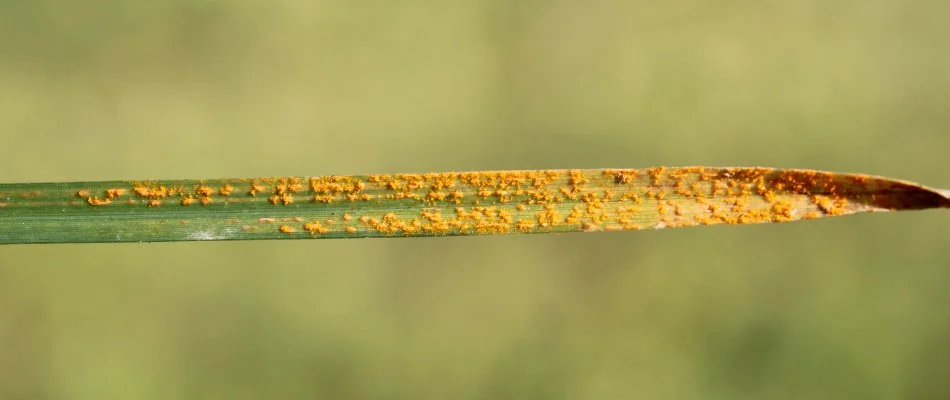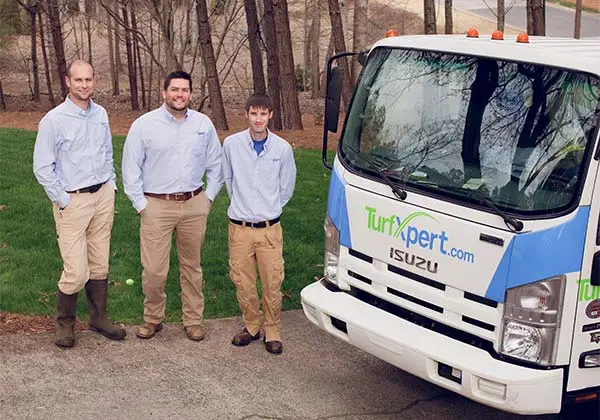Lawn rust, a common fungal disease that affects lawns, can be a frustrating issue for property owners in Georgia. This pesky disease appears as orange or rust-colored powder on the grass blades, resembling rust on metal. It thrives in cool, moist conditions, typically during the fall and spring. Identifying this disease is essential in order to take appropriate measures and prevent further damage to your lawn. Lawn rust can weaken the grass, leaving it vulnerable to other stresses and opportunistic weeds. To effectively deal with rust, seeking professional help is highly recommended. Trained experts can accurately diagnose the disease, assess its severity, and administer appropriate treatments. Their expertise and timely intervention can safeguard the health and beauty of your lawn, ensuring a lush and vibrant landscape throughout the year.
What does lawn rust look like?

Lawn rust is a common and detrimental lawn disease that property owners should be aware of. It appears as a powdery, rust-like substance on the grass blades, giving them an orange, yellow, or brownish color. This disease is caused by fungi that attack the grass and weaken its overall health and appearance.
As the disease progresses, you may notice thinning of the grass, and in severe cases, patches of dead or dying turf. Rust is particularly problematic for cool-season grasses, such as Kentucky bluegrass and perennial ryegrass, but it can also affect warm-season grasses.

Lawn rust may leave a rust-colored residue on your shoes or pant legs when you walk across affected areas.
What conditions does lawn rust thrive in?
Lawn rust thrives in conditions that are favorable for fungal growth. It tends to develop when the weather is humid, and the grass remains wet for extended periods, such as during dewy mornings or after frequent rain showers. The disease is more prevalent in lawns with poor air circulation and excessive moisture, creating an ideal environment for the fungi to spread.
Lawns that are under stress due to factors like inadequate irrigation, poor soil nutrition, or mowing too short are also more susceptible to lawn rust. Stressed grass is weakened, making it an easier target for disease development.
What should you do if rust infects your lawn?
If you suspect your lawn is affected by rust, prompt action is essential to mitigate the damage and restore the health of your grass. While minor cases of lawn rust can be managed through cultural practices like improving mowing habits, irrigation, and soil fertility, more severe infections may require professional intervention.
When rust infects your lawn, it's advisable to seek help from lawn care professionals. They can accurately diagnose the issue and recommend the most effective course of action to eliminate the disease and promote the recovery of your lawn. Professionals may suggest applying fungicides to control the spread of the rust fungus and prevent further damage to your turf.
To prevent future outbreaks, lawn care professionals can also provide guidance on proper lawn maintenance practices, such as mowing at the correct height, watering in the early morning to avoid prolonged moisture on the grass, and implementing a balanced fertilization schedule. Creating an environment that supports healthy grass growth will make your lawn less susceptible to lawn rust and other diseases.
Give us a call today to schedule our lawn rust control service.
Don't let diseases like rust take over your lawn! If your lawn is battling a troubling rust infection or you fear the threat of future outbreaks, we have the immediate solution you need. Our expert team provides lawn rust treatments to combat existing rust infections. We serve commercial and residential property owners, as well as HOAs, in Woodstock, GA, and nearby communities like Roswell and Alpharetta. You can trust our team to swiftly restore your lawn's health and keep it thriving. There's no time to waste! Call us today at (833) 444-8873 to sign up for our rust control service!



Comments (0)
Thanks for your comment!
Thanks for your feedback! Your comments have been successfully submitted! Please note, all comments require admin approval prior to display.
Error submitting comment!
There is a problem with your comment, please see below and try again.